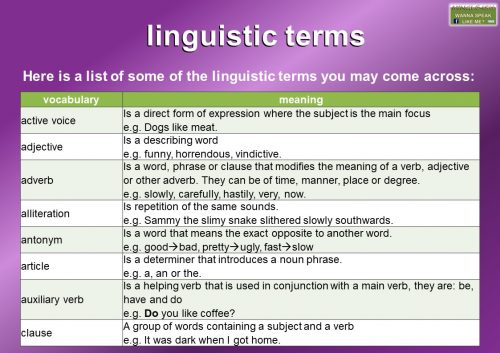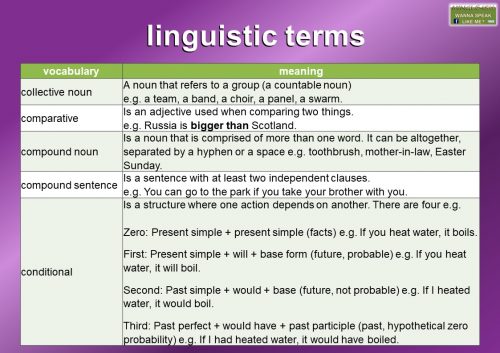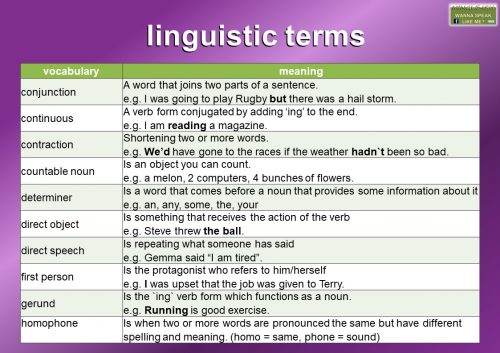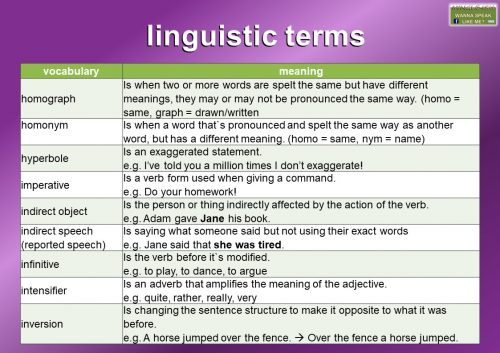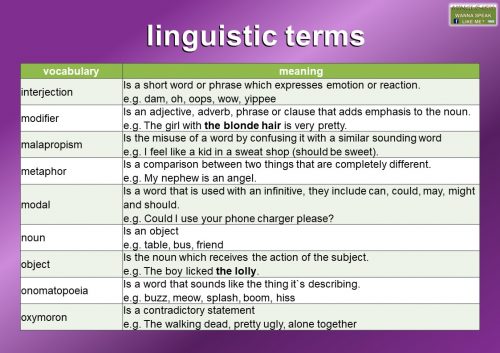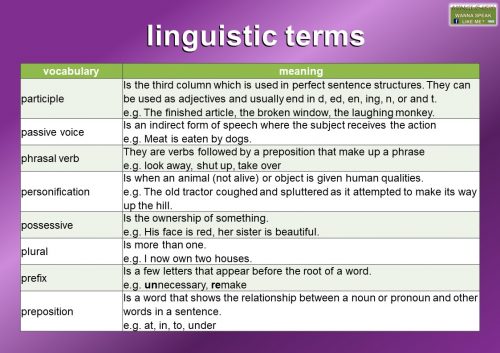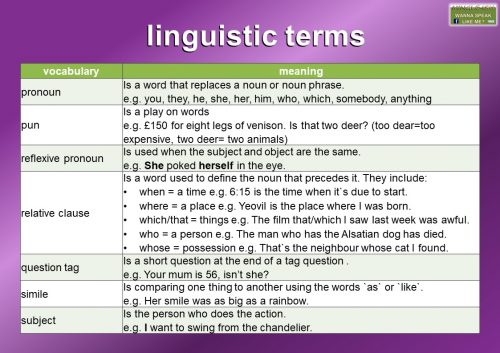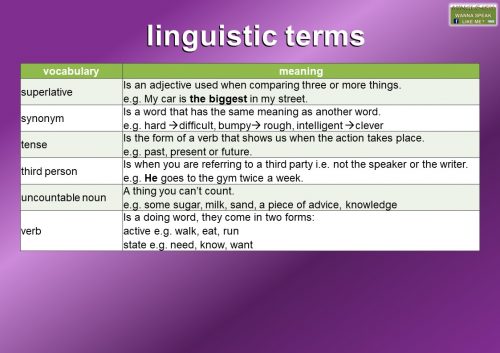Do you know your adjectives from your adverbs?
Do you know the difference between a conditional and a conjunction?
Can you differentiate between a pronoun and a preposition?
Even if you do, the following slides are worth a look to refresh your brain.
- active voice
meaning – a direct form of expression where the subject is the main focus
e.g. Dogs like meat.
- adjective
meaning – a describing word
e.g. funny, horrendous, vindictive
- adverb
meaning – a word, phrase or clause that modifies the meaning of a verb, adjective or other adverb. They can be of time, manner, place, or degree.
e.g. slowly, carefully, hastily, very, now.
- alliteration
meaning – repetition of the same sounds
e.g. Sammy the slimy snake slithered slowly southwards.
- antonym
meaning – a word that means the exact opposite to another word
e.g. good/bad, pretty/ugly, fast/slow
- article
meaning – is a determiner that introduces a noun phrase.
e.g. a, an or the
- auxiliary verb
meaning – a helping verb that is used in conjunction with a main verb, they are: be, have and do
e.g. Do you like coffee?
- clause
meaning – group of words containing a subject and a verb
e.g. It was dark when I got home.
- collective noun
meaning a noun that refers to a group (a countable noun)
e.g. a team, a band, a choir, a panel, a swarm.
- comparative
meaning – an adjective used when comparing two things
e.g. Russia is bigger than Scotland.
- compound noun
meaning – a noun that is comprised of more than one word. It can be altogether, separated by a hyphen or a space
e.g. toothbrush, mother-in-law, Easter Sunday
- compound sentence
meaning – a sentence with at least two independent clauses
e.g. You can go to the park if you take your brother with you.
- conditional
meaning – a structure where one action depends on another
There are four e.g.
zero: Present simple + present simple (facts) e.g. If you heat water, it boils.
first: Present simple + will + base form (future, probable) e.g. If you heat water, it will boil.
second: Past simple + would + base (future, not probable) e.g. If I heated water, it would boil.
third: Past perfect + would have + past participle (past, hypothetical zero probability) e.g. If I had heated water, it would have boiled.
- conjunction
meaning – a word that joins two parts of a sentence
e.g. I was going to play Rugby but there was a hailstorm.
- continuous
meaning – a verb form conjugated by adding ‘ing’ to the end
e.g. I am reading a magazine.
- contraction
meaning – shortening two or more words
e.g. We’d have gone to the races if the weather hadn`t been so bad.
- countable noun
meaning – an object you can count
e.g. a melon, 2 computers, 4 bunches of flowers.
- determiner
meaning – a word that comes before a noun that provides some information about it
e.g. an, any, some, the, your
- direct object
meaning – something that receives the action of the verb
e.g. Steve threw the ball.
- direct speech
meaning – repeating what someone has said
e.g. Gemma said “I am tired.”
- first person
meaning – the protagonist who refers to him/herself
e.g. I was upset that the job was given to Terry.
- gerund
meaning – the `ing` verb form which functions as a noun
e.g. Running is good exercise.
- homophone
meaning – when two or more words are pronounced the same but have different spelling and meaning. (homo = same, phone = sound)
- homograph
meaning – when two or more words are spelt the same but have different meanings, they may or may not be pronounced the same way. (homo = same, graph = drawn/written)
- homonym
meaning – when a word that`s pronounced and spelt the same way as another word but has a different meaning. (homo = same, nym = name)
- hyperbole
meaning – an exaggerated statement
e.g. I’ve told you a million times I don’t exaggerate!
- imperative
meaning – a verb form used when giving a command
e.g. Do your homework!
- indirect object
meaning – the person or thing indirectly affected by the action of the verb
e.g. Adam gave Jane his book.
- indirect speech (reported speech)
meaning – saying what someone said but not using their exact words
e.g. Jane said that she was tired.
- infinitive
meaning – the verb before it`s modified
e.g. to play, to dance, to argue
- intensifier
meaning – an adverb that amplifies the meaning of the adjective
e.g. quite, rather, really, very
- inversion
meaning – changing the sentence structure to make it opposite to what it was before
e.g. A horse jumped over the fence.
Over the fence a horse jumped.
- interjection
meaning – a short word or phrase which expresses emotion or reaction
e.g. dam, oh, oops, wow, yippee
- modifier
meaning – an adjective, adverb, phrase, or clause that adds emphasis to the noun
e.g. The girl with the blonde hair is very pretty.
- malapropism
meaning – the misuse of a word by confusing it with a similar sounding word
e.g. I feel like a kid in a sweat shop (should be sweet).
- metaphor
meaning – a comparison between two things that are completely different
e.g. My nephew is an angel.
- modal
meaning – a type of verb that is used with the infinitive, they include can, could, may, might, and should.
e.g. Could I use your phone charger please?
- noun
meaning – an object
e.g. a table, a bus, a friend
object
meaning – the noun which receives the action of the subject
e.g. The boy licked the lolly.
onomatopoeia
meaning – a word that sounds like the thing it`s describing
e.g. buzz, meow, splash, boom, hiss
oxymoron
meaning – a contradictory statement
e.g. The walking dead, pretty ugly, alone together
participle
meaning – the third column which is used in perfect sentence structures. They can be used as adjectives and usually end in d, ed, en, ing, n, or and t.
e.g. The finished article, the broken window, the laughing monkey.
passive voice
meaning – an indirect form of speech where the subject receives the action
e.g. Meat is eaten by dogs.
phrasal verb
meaning – verbs followed by a preposition that make up a phrase
e.g. look away, shut up, take over
personification
meaning – when an animal (not alive) or object is given human qualities
e.g. The old tractor coughed and spluttered as it attempted to make its way up the hill.
possessive pronoun
meaning – the ownership of something
e.g. His face is red, her sister is beautiful.
plural
meaning – more than one
e.g. I now own two houses.
prefix
meaning – a few letters that appear before the root of a word
e.g. unnecessary, remake
preposition
meaning – a word that shows the relationship between a noun or pronoun and other words in a sentence
e.g. at, in, to, under
pronoun
meaning – a word that replaces a noun or noun phrase
e.g. you, they, he, she, her, him, who, which, somebody, anything
pun
meaning – is a play on words
e.g. £150 for eight legs of venison. Is that two deer? (too dear=too expensive, two deer= two animals)
reflexive pronoun
meaning – used when the subject and object are the same
e.g. She poked herself in the eye.
- relative clause
meaning – is a word used to define the noun that precedes it. They include:
when = a time e.g. 6:15 is the time when it`s due to start.
where = a place e.g. Yeovil is the place where I was born.
which/that = things e.g. The film that/which I saw last week was awful.
who = a person e.g. The man who has the Alsatian dog has died.
whose = possession e.g. That`s the neighbour whose cat I found.
- question tag
meaning – a short question at the end of a tag question
e.g. Your mum is 56, isn’t she?
- simile
meaning – comparing one thing to another using the words `as` or `like`
e.g. Her smile was as big as a rainbow.
- subject
meaning – the person who does the action
e.g. I want to swing from the chandelier.
- superlative
meaning – an adjective used when comparing three or more things
e.g. My car is the biggest in my street.
- synonym
meaning – a word that has the same meaning as another word
e.g. hard -> difficult, bumpy -> rough, intelligent -> clever
- synonym
meaning – a word that has the same meaning as another word
e.g. hard -> difficult, bumpy -> rough, intelligent -> clever
- tense
meaning – the form of a verb that shows us when the action takes place
e.g. past, present, or future.
- third person
meaning – when you are referring to a third party i.e. not the speaker or the writer
e.g. He goes to the gym twice a week.
- uncountable noun
meaning – a thing you can’t count
e.g. some sugar, milk, sand, a piece of advice, knowledge
